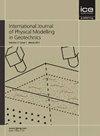Mitigating Liquefaction-Induced Displacements of Shallow Foundation using Helical Piles
IF 1.2
4区 工程技术
Q4 ENGINEERING, GEOLOGICAL
International Journal of Physical Modelling in Geotechnics
Pub Date : 2022-06-06
DOI:10.1680/jphmg.21.00039
引用次数: 2
Abstract
During previous earthquakes, displacements of shallow foundations on liquefiable sites caused significant damage to overlying super-structures leading to casualties and catastrophic economic loss. Various countermeasures have been developed to minimize liquefaction-related damages while minimizing cost and environmental impact. This study aims to evaluate the use of helical piles as a possible technique to mitigate the settlement, tilting, and sliding of shallow foundations on the liquefiable ground in seismic conditions. For this purpose, twelve 1g shaking table tests were conducted on uniform loose saturated Babolsar sand subjected to harmonic base input motion for (1) free-field condition, (2) a model foundation on the soil surface, and (3) a model foundation underpinned by helical piles. The effects of input motion amplitudes and the number of helical piles were investigated in terms of acceleration response, excess pore water pressure (EPWP), and foundation displacements. The results confirmed the satisfactory performance of helical piles in reducing shallow foundation displacements. In particular, the mean permanent settlements were reduced by 45% and 75% when using four and eight helical piles, respectively. Similar trends were observed for the shallow foundation permanent tilting and sliding; permanent tilting was reduced by 30% and 59% when using four and eight helical piles, respectively, while these results were 45% and 68% for the sliding.螺旋桩减轻浅基础液化引起的位移
在以前的地震中,可液化场地的浅基础位移对上覆上层结构造成重大破坏,导致人员伤亡和灾难性的经济损失。人们已经制定了各种对策,以尽量减少与液化有关的损害,同时尽量减少成本和环境影响。本研究旨在评估螺旋桩作为一种可能的技术来减轻地震条件下液化地面上浅基础的沉降、倾斜和滑动。为此,在均匀松散饱和Babolsar砂上进行了12次1g振动台试验,分别为:(1)自由场条件,(2)土表面模型基础,(3)螺旋桩支撑模型基础。在加速度响应、超孔隙水压力(EPWP)和基础位移方面,研究了输入运动幅值和螺旋桩数量的影响。结果表明,螺旋桩在减小浅基础位移方面具有良好的效果。特别是,当使用4根和8根螺旋桩时,平均永久沉降分别减少了45%和75%。浅基础的永久倾斜和滑动也有类似的趋势;当使用4根和8根螺旋桩时,永久倾斜分别减少了30%和59%,而滑动桩的结果分别减少了45%和68%。
本文章由计算机程序翻译,如有差异,请以英文原文为准。
求助全文
约1分钟内获得全文
求助全文
来源期刊

International Journal of Physical Modelling in Geotechnics
ENGINEERING, GEOLOGICAL-
CiteScore
3.60
自引率
15.80%
发文量
26
期刊介绍:
International Journal of Physical Modelling in Geotechnics contains the latest research and analysis in all areas of physical modelling at any scale, including modelling at single gravity and at multiple gravities on a centrifuge, shaking table and pressure chamber testing and geoenvironmental experiments.
 求助内容:
求助内容: 应助结果提醒方式:
应助结果提醒方式:


